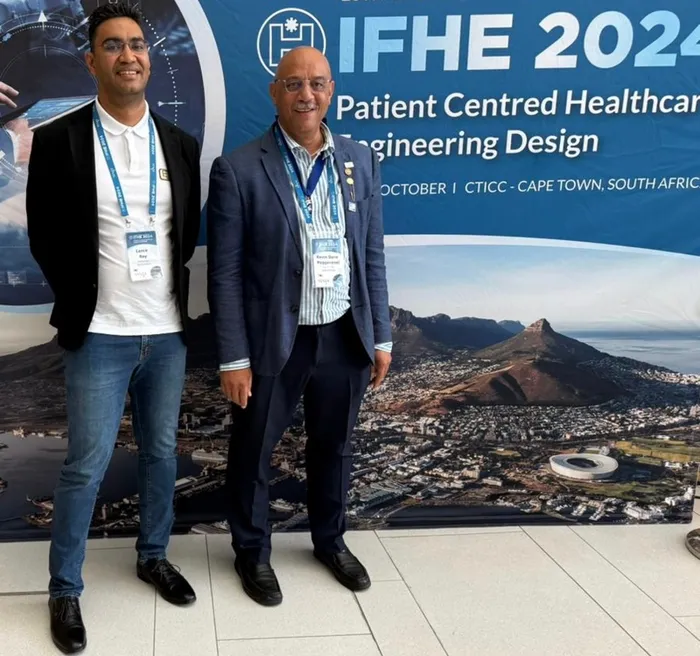NHI showdown and cutting-edge solutions dominate healthcare engineering summit

Supplied Lance Roy, AI Engineers CEO and Kevin Poggenpoel,President of the International Federation of Hospital Engineering (IFHE). Picture: Supplied.
Image: Supplied
Global leaders in healthcare engineering gathered in Cape Town last week to share insights and knowledge aimed at streamlining the industry.
The International Federation of Healthcare Engineering (IFHE) 2024 Conference, a biennial event, attracted key figures from the public and private sectors, along with medical experts and infrastructure specialists, to collectively address challenges and exchange information.
Addressing the “elephant in the room,” CEO of Business Unity South Africa, Cas Coovadia, closed the three-day event with a candid discussion on the National Health Insurance (NHI) Act.
According to Coovadia, if the bill is passed in its current form, it could lead to serious consequences, including mass investor withdrawal.
“We met with the president last month and put forward our amendments. We told him that we can either take the low road, leading to a tedious and costly legal battle, or take the high road and be amicable,” he said.
As the nation eagerly awaits the next steps and a clear strategy for implementing the Act, all participants agreed it is crucial that all South Africans have access to affordable healthcare.
Also on the agenda were infection prevention and control techniques, revolutionary artificial intelligence (AI) innovations in healthcare, and smart management and operational approaches aimed at streamlining processes and optimising costs, making healthcare delivery both efficient and sustainable.
A key focus was building a sustainable future for healthcare, urging hospitals to adopt innovative energy-saving solutions to reduce costs and carbon emissions.
Lance Roy, CEO of Durban-based engineering consulting firm AI Engineers, noted that South African hospitals are severely overburdened by a shortage of available beds and the inconsistent availability of critical utilities.
“Efficiency and optimal utilisation of energy and engineering resources are non-negotiable. Without effective system utilisation and design, facility performance is diminished. Installing efficient and sustainable infrastructure through hybrid systems and intelligent energy management will improve performance indices for hospital infrastructure," he said.
“At AI Engineers, we have achieved energy reductions, energy recovery, and water-saving solutions by implementing intelligent hybrid HVAC, hot water, and sustainable energy systems. Over the past two years, we’ve integrated Fourth Industrial Revolution (4IR) technology in various projects.
“We are particularly proud of a hybrid HVAC and hot water generation system, incorporating photovoltaic (PV) and battery storage, which was commissioned in 2024. This project, in collaboration with our German partners, successfully demonstrated the benefits of sustainable technology at a KwaZulu-Natal facility.”
Kevin Poggenpoel,President of the International Federation of Hospital Engineering (IFHE) highlighted the importance of inclusivity in sustainability at the conference.

“There are valuable lessons for all healthcare stakeholders from what is shared by larger international groups. Smaller entities can also build networks and connect with individuals who are willing to share their experiences. Spreading knowledge is part of our mission at SAFHE and IFHE,” he said.
Commenting on the NHI, Poggenpoel added, “We received a clear message that collaboration is essential if we are to find solutions for better healthcare for our country’s citizens.”
IOL